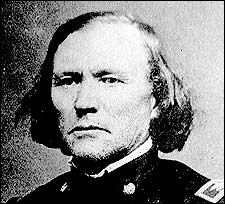 |
| Kit Carson |
Actually Jim and Kit were third cousins. They shared the same great-great grandfather: Moses Carson. And since Jim's sister, Anna, was my grandmother's grandmother, I suppose I'm a distant cousin of Kit Carson too.
But fame, I've come to understand, is something you want to touch with a long pole.
Carson was born in Kentucky but moved to Missouri when he was just a baby. His parents settled near Boone's Lick in the middle of the state and were friends with the sons of Daniel Boone. Kit's father died when he was 8 and Kit was apprenticed to a saddle-maker in nearby Franklin.
Now Franklin is a town where less than a hundred people live today, but in 1821 when Missouri became a state, Franklin was one of the most popular cities. That's where the Santa Fe trail began. People stopped by the saddle shop on their way West. It wasn't long before 16-year-old Kit joined a wagon train full of trappers.
He supposedly killed his first Indian when he was 19 and became known for his ability to hunt and kill Indians who had attacked settlers or stolen their horses.
In the 1840s John C. Fremont hired him as a guide for his expeditions mapping the Oregon Trail and California. Fremont's reports brought national fame to Kit Carson. By 1847 exaggerated versions of Carson's adventures filled dime novels that everyone read.
Carson served in the Mexican-American War and led New Mexico's Union troops during the Civil War. Since there weren't many Confederates to fight in New Mexico, Carson spent most of the war fighting Apaches and Navajo.
Carson served as an Indian agent for the Utes and one of his final acts was to accompany Ute chiefs to Washington so they could plead their case to President Johnson. He died in Colorado in 1868 of an aortic aneurysm.
In the 20th Century, many historians criticized Carson's participation the military's slaughter of whole Indian villages during the Civil War era. Tales of his early Indian fighting years also show an over-eagerness to kill Indians whether they were a threat or not.
Fame is a fickle thing. The same public opinion that calls you a hero can turn into hatred and blame. Cousin Jim would understand.

No comments:
Post a Comment